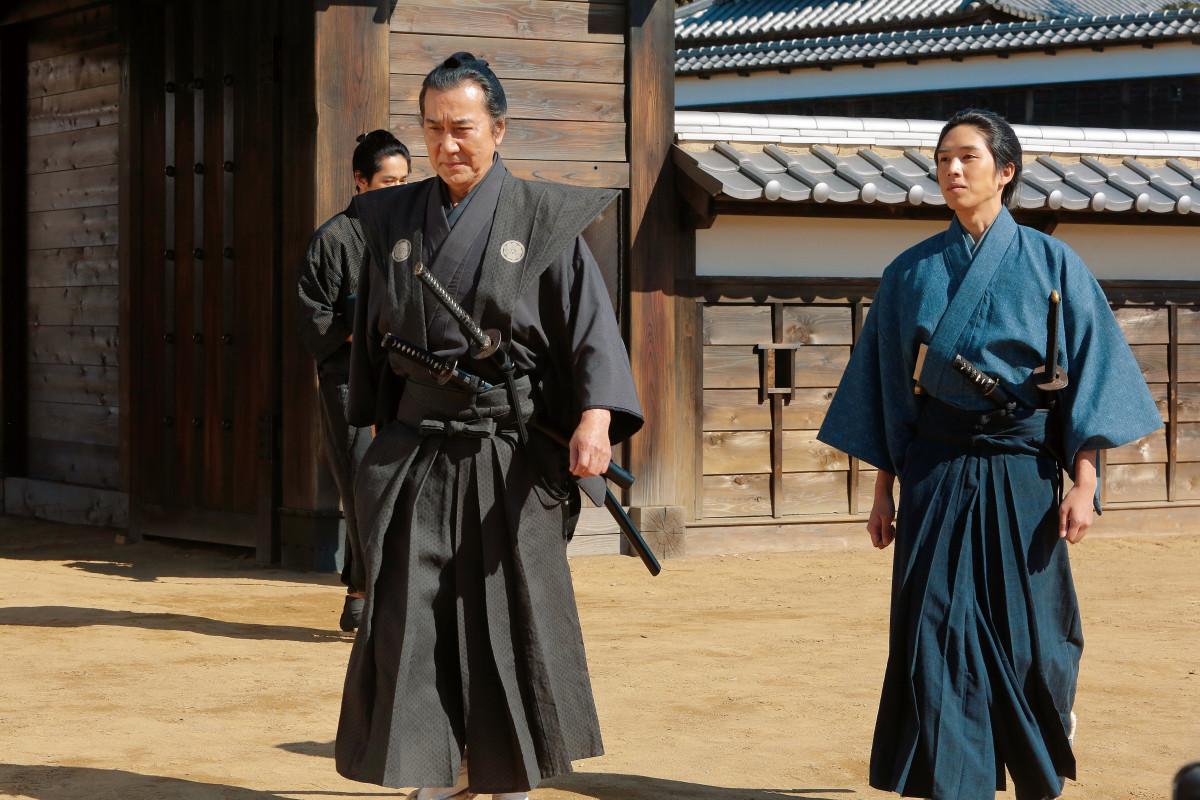
The late Ryotaro Shiba remains one of the most celebrated authors of his time, with his work standing front and center for many a film adaptation. Such is the case for his 1968 novel, Touge, adapted and directed for the big screen by Takashi Koizumi, who plies his trade once more – following a career that includes having worked as assistant director for the legendary Akira Kurosawa on films like Ran (1985) and Kagemusha (1980) – now with his sixth narrative feature, The Pass: Last Days Of The Samurai, under his belt.
After 260 years of peace, Western colonial influence has shaken the atmosphere of Japan under the Tokugawa shogunate, compelling the 15th shogun, Yoshinobu (Higashide Masahiro) to restore imperial rule to help realign and unify Japan in 1867 – a decision that only proved to be problematic than expected with two pro-imperial influencers out of Satsuma province insisting that the shogun be deposed completely. The move was met with both acquiesence and resistance, splitting the country in half between the armies of Western imperial loyalists and Eastern shogunate forces in the East vying for the neutral domain of Nagaoka Castle in Echigo, with Tsuginosuke Kawai (Koji Yakusho), chief retainer of Tokugawa loyalist Lord Makino (Tatsuya Nakadai), determined to avoid war by all means possible whilst preparing for unrest from either side following the pivotal launch of the Boshin War the following year.
Resolved to maintain armed neutrality, Kawai, convinced that war would devastate the nation, desperately attempts to negotiate peace between both sides. However, the pressure is building, particularly from the West, whose Seiichiro Iwamura (Hidetaka Yoshioka), deputy commander out of Tosa and frontman for the imperial allies of Satsuma and Choshu domains, who has grown frustrated with Kawai’s inaction and lack of support. With time running out and no progress from the West, it’s up to Kawai to prepare for the worst, as the imperial army aims to zero-in on the strategically vital Enoki Pass leading to Nagaoka Castle.
Yakusho lends a charismatic and illuminating performance in the lead role of Kawai, whose story is narrated by the voice of loving wife Osuga, played by actress Takako Matsu. The film takes a wondrous look at exploring Kawai’s demeanor and dimensions throughout the film, between dealing with politics and bureaucracy, overseeing training drills for Nagaoka’s army, and his domestic life at home with Osuga. Some of the film’s best scenes comprising this is when Kawai takes Osuga out for an evening out to drink with geisha and dance to some music, and later in the evening, sends her home with their bodyguard as he’s nearly ambushed by Tokugawa loyalists nearly ready to kill him before he sets them straight to instill discipline and faith in his leadership as the only domain not to have completely taken a side.
It’s a moment that further helps discern the kind of man Kawai is when he meets up with imperial forces to try and negotiate peace. Compared to the Tokugawa loyalists, the West is provenly more recalicitrant, abrasive, and impatient. There’s a moment when Iwamura is awoken in the evening to learn that Kawai hasn’t left the territory yet, and for a moment, he is curious about Kawai’s mannerism which he is told is “extremely polite” but also “deaf” to any commands to leave, and sometimes paces back and forth while “gazing at the moon”. You kind of reckon that maybe Iwamura might warm up to considering Kawai’s position, although as the film (and for that matter, history) tells it, Iwamura’s rejection is enough to compel Kawai to choose what’s best for his domain and his fief.
A film said to be long-awaited by fans of jidaigeki cinema, Koizumi’s The Pass: Last Days Of The Samurai takes an extraordinary look at an historical moment that’s often the center of, or otherwise hinted at in other films. If you watch a lot of Japanese period films and samurai epics, you sort of connect the dots just a little bit more, and it becomes very interesting overtime to observe (I’m even more curious to watch Masato Harada’s 2017 pic, Sekigahara, which is also based on a novel written by the aforementioned Shiba). Of course, it doesn’t make you a history buff, but it’s nice to feel bitten by such a peculiar bug.
Shot with stunning cinematography, combined visible poetry, and dignified performances from the cast, Koizumi’s latest is a film that stands to be one of this most exemplary by far as a film befitting its genre. There’s a timelessness to its overall look and mesmerizing feel, topped with grand set pieces, costumes, and sequences that capture something as closely authentic to Koizumi’s vision of Shiba’s literary historical take. The casting addition of Nakadai certainly brings things full circle as the actor shares plenty of DNA in the late Kurosawa’s filmography, which in part makes The Pass: Last Days Of The Samurai, a truly rich and satisfying moviegoing experience.
The Pass: Last Days Of The Samurai screened for this year’s installation of the Fantasia International Film Festival.
